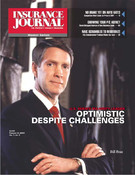Lawmakers have revamped a bill that would deny workers benefits if they were injured on the job while drunk or on drugs-an idea rejected by the Ohio Supreme Court in 2002 in a ruling hailed by labor unions and criticized by business groups.
The new bill requires a doctor or police officer to ask for a drug or alcohol test if the worker is suspected of being impaired. The court found that the original law, which forced workers to prove they were not impaired, violated constitutional protections against unreasonable searches.
Rep. Bob Gibbs, a Lakeville Republican, believes his bill will stand up in court. The House Commerce and Labor Committee scheduled a vote for Tuesday on whether to recommend its passage by the full House.
The bill also requires the Bureau of Workers’ Compensa-tion to notify workers that they may lose benefits if they are injured while impaired, Gibbs said.
“When I sat down with the trial lawyers and other groups, I didn’t want to make notification such a problem that it made more paperwork for employers,” Gibbs said.
Workers with drug habits or drinking problems should get help, but they should not be allowed to endanger fellow workers, Gibbs said.
“We can do all the education in the world … but at some point you need to have consequences for illegal behavior,” he added.
The makeup of the state Supreme Court is likely to help its chances of becoming law. The original law was voided by a 4-3 majority that often ruled in favor of unions at the expense of business interests. However, a key vote in that majority was lost when Republican Justice Andy Douglas was forced to retire because of his age.
His successor, Republican Justice Maureen O’Connor, joined the former minority last year in reversing a previous ruling and found companies were not liable for insurance claims by employees injured or killed in non-work related accidents.
O’Connor, an Akron Republican, gave no promises during her 2002 campaign. She said only that she would interpret the law strictly when ruling.
Labor groups still oppose the bill. They feel it would allow employers to deny benefits to workers with legitimate injuries.
“Since the Supreme Court … struck down an attempt by the Legislature to unconstitutionally burden working men and women of Ohio, how can this Legislature try to pass another bill with the same provisions?” said Stephen Mindzak, a United Auto Workers lawyer, in testimony to the committee in November.
But Gibbs said the issue is more about safety than workers’ rights.
“We’re trying to improve safety at the workplace,” he said.
Was this article valuable?
Here are more articles you may enjoy.


 Meta Loses Insurance for Defense in Major Social Media Addiction Litigation
Meta Loses Insurance for Defense in Major Social Media Addiction Litigation  Hackers Used AI to Breach 600 Firewalls in Weeks, Amazon Says
Hackers Used AI to Breach 600 Firewalls in Weeks, Amazon Says  Baldwin Posts Fourth Quarter Loss; Carlisle Takes Over Underwriting Group
Baldwin Posts Fourth Quarter Loss; Carlisle Takes Over Underwriting Group  Premium Slowdown, Inflation Factors to Lead to Higher P/C Combined Ratio: AM Best
Premium Slowdown, Inflation Factors to Lead to Higher P/C Combined Ratio: AM Best 


